An HED Story of Love & Hope
Olivia Daniel’s story began in Appleton, Wisconsin. The first-born child to Kathy and Mike, she had unexplained symptoms from birth that their family doctor could not explain: fevers, problems with nasal concretions, peeling/dry skin, respiratory illnesses, trouble breast feeding and trouble drinking from a bottle, episodes of aspiration pneumonia, failure to thrive and gain weight, slow head growth and wax concretions in her ears. It was perplexing for the new parents.
When a year passed and no teeth had erupted, the Daniels’ dentist referred them to a pediatric dentist who was the first to suggest hypohidrotic ectodermal dysplasia (HED) as a diagnosis.
“A month later, Olivia was examined by a clinical geneticist who confirmed the diagnosis,” Kathy said. “Olivia was just shy of turning two years old. The geneticist was able to give us some information and explain the syndrome, but we left that appointment with many questions. And eager to find answers.”
Finding Her Tribe
That’s where the National Foundation for Ectodermal Dysplasias (NFED) was able to help. Shortly after the geneticist appointment, Kathy reached out to the NFED.
“I am so grateful the NFED was there for us!” Kathy said. “They provided us with a wealth of information not available anywhere else. They provided hope for us for Olivia’s health and future and a sense of relief that we didn’t have to face this alone.”
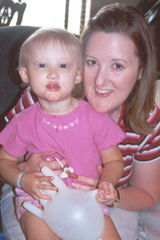
Eight months after the diagnosis, Mike and Kathy took Olivia and six-month-old brother, Owen, to their first NFED Family Conference.
Kathy said, “I just remember checking into the hotel and seeing ‘familiar faces’ of people we were seeing and meeting for the first time. We learned so much that first year. I can’t put into words what an amazing and emotional experience it was.
“And the friendships…I loved that I wasn’t alone as a parent and I loved even more that Olivia would grow up and never be alone either. Our family participated in research that first year, and that helped us immediately feel empowered over her syndrome and it gave us hope for a healthier future.”
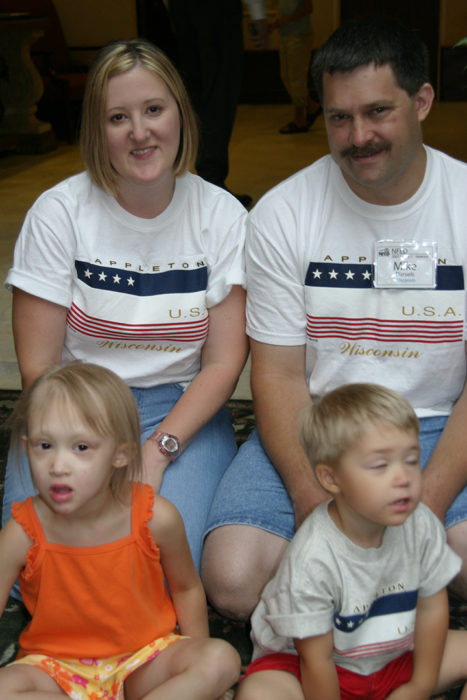
The Daniels became regulars at the annual conferences for the next decade. There were new information and medical advances to learn, friendships to form and opportunities to give back.
Olivia has lots of great memories from attending so many Family Conferences.
“Attending conferences made me feel like I wasn’t alone. They made me feel like a second family or a tribe as I call it.”
According to Kathy, they loved finding small ways to give back whether it was participating in fundraisers, donating Cool-Dannas or volunteering for research and Grand Rounds (educating area medical staff with the NFED).
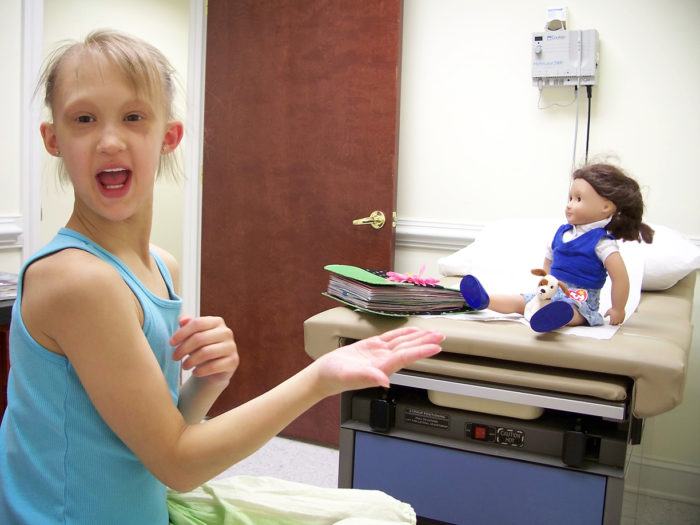
“Every little fact the researchers learn is a small step on the road towards early diagnosis, improved treatment, and someday, a cure!” Kathy said.
Dance Moves
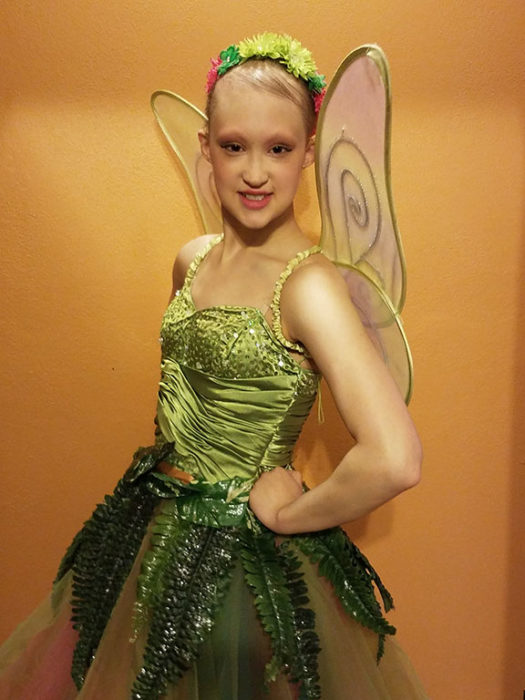
Since her diagnosis two decades ago, Olivia has faced significant challenges as someone who is affected by a rare genetic disorder and has unrelated learning/development and mental health challenges. Now 22, Olivia has learned to channel her feelings and experiences into dance, creative acts of service and kindness.
Dance especially has played an important role in helping Olivia cope with her HED and mood disorder. She started dancing at age three and hasn’t stopped since.
“Whenever I feel down, depressed, I may feel like pulling away from everyone, but I know dance helps me get through it. I can share my story through dance, too,” Olivia said.
While she experimented with many different styles, ballet was always her favorite. It was a little gentler on her body temperature compared to faster paced and more cardio intense styles in which she burned out more quickly. Olivia has hypohidrosis so her sweat glands don’t function normally.
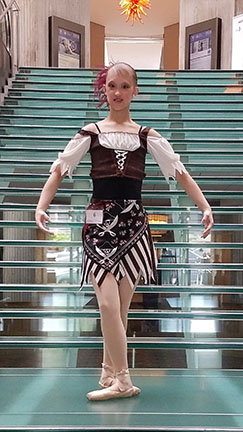
“Olivia uses dance to express herself and release her emotions. Surrounding herself with people that shared a common interest also helped her fit in at dance. She had challenges with overheating but learned how to manage it.”
The family chose a studio with air conditioning and brought in extra fans. Olivia took breaks when she needed to, used water mists and Cool-Dannas to cool down and was sure to educate her dance instructors about HED.
Olivia Meets Her Twin
One of the many places where Olivia showcased her dance moves was at the Talent Shows the NFED used to have at the Family Conference. She met a new girl, Marianna, at Kids Camp and they became besties.
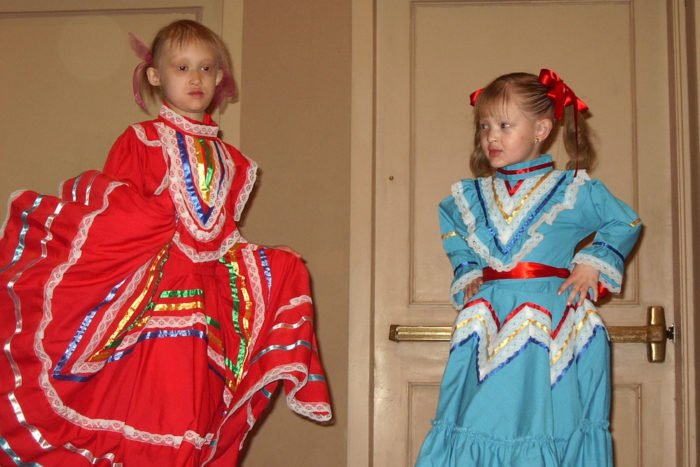
“I had a special connection with Marianna from Mexico when I was younger. We use to dance an American dance and a Mexican dance each year at conference for the talent show,” Olivia said.
Kathy warmly remembers the year when Olivia showed her new friend her dentures and taught her how she wears them. She showed Marianna how she used the paste to make them stick.
“It was great to see, that even at five years old, Olivia could share her personal experience and make a positive difference for someone affected by HED that would soon be getting ready for her own denture experience. Olivia did not know Spanish and Marianna did not speak English, but the girls did not need words to communicate.
“They smiled and hugged, laughed and played. The girls shared a much greater spiritual connection. I was told later that Marianna saw a picture of Olivia on the NFED website and felt a connection even before they met, saying Olivia was her twin.”
Her Own Best Advocate
Olivia’s school years came with learning and emotional/mental health challenges. Her mom said she did a great job accepting her physical characteristics and learned early how to be her own best advocate. Olivia used her voice to educate others about her symptoms. But, what was more difficult was making friends. She was always caught between two worlds: typical and non-typical.
“Olivia was judged by both how she looked, and her spectrum of developmental and learning disabilities,” Kathy said. “People sometimes judged her by her unique appearance and automatically thought she wasn’t capable or smart enough. And sometimes she proved how smart she was only to not be socially accepted by her ‘typical peers’.”
Finding her place in the right classroom also proved to be tough.
“Olivia has high verbal language skills and desires to be reasonably challenged academically,” Kathy said. “Education was tricky in school because she is smart, but also has varied patterns of strengths and weakness with learning. Olivia loves to learn but sometimes she wasn’t challenged enough by special programs and sometimes she was frustrated because regular academic classes were too fast paced.”
Olivia persevered and graduated with the class of 2017. Since, she participated in a special education/work transition program called Project Search at a local hospital in Appleton. Over a 9-month period, she completed three volunteer 10-week work internships where she gained valuable work skills, life skills and work experience. She moved on to a paid internship at a small office in Appleton.
Miss Amazing
Outside of school and work, Olivia has been a creative force. She’s spent the last four years competing in local special needs pageants. It was a way for her to showcase and share her talent and passion for ballet.
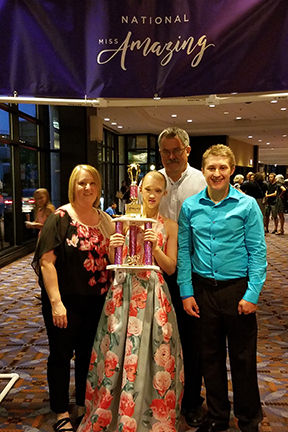
Olivia captured 1st runner up in the National Miss Amazing competition in 2019. 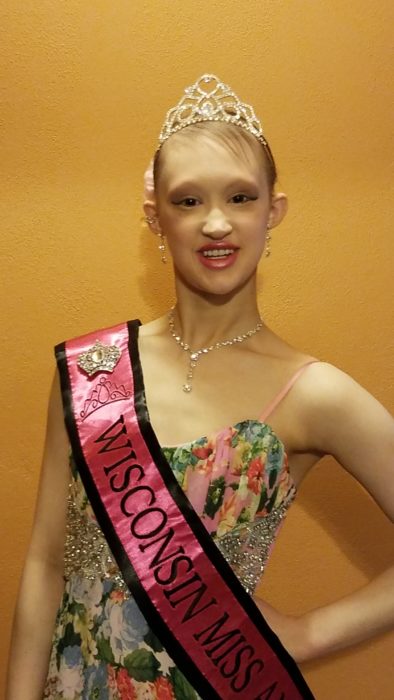
Olivia was named Wisconsin Miss Amazing Teen in 2018.
She excelled in the pageants and quickly earned a string of titles in various pageants including Uniquely You Teen in 2017, Wisconsin Miss Amazing Teen in 2018, Wisconsin Miss Amazing Jr. Miss in 2019, and the First Runner Up for National Miss Amazing Jr. Miss 2019. Both organizations help girls and women with disabilities grow in their confidence, leadership and advocacy skills. Olivia loves making appearances and making a difference by helping others through volunteer work and sharing her story.
Operation Cool Danna
Through the pageants, Olivia launched two platforms to educate and serve others using her creative ideas. The first is called Operation Cool-Danna, which is a program to raise awareness for ectodermal dysplasia syndromes, the NFED, and also for heat exhaustion/heat stroke.
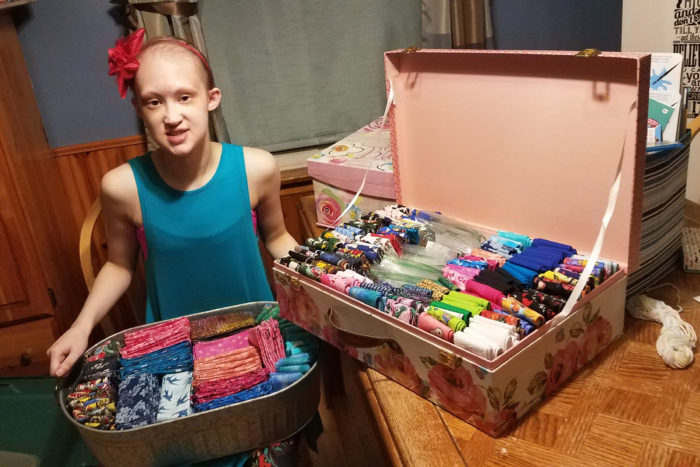
“This is important to Olivia because a main feature of her syndrome is that she doesn’t sweat and is unable to internally regulate her body temperature. Our family makes cooling neck bands, which we call Cool-Dannas. We’ve dedicated hundreds of hours to Operation Cool-Danna.
For the past two years, the Daniels crew set up a fundraising booth at a local pool during her brother’s swim meet. Olivia shared her personal story with HED as a way to educate their community and raise awareness.
Olivia’s story will continue with the second part of this blog publishing on December 10th. Come back to learn about her launch of Operation in Full Bloom, how she rediscovered her tribe, and what advice she has to share with others who are affected by ectodermal dysplasias.
Give Hope Today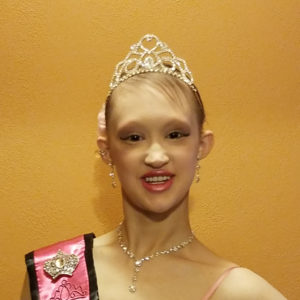
Very powerful story, I love it. You are an amazing soul, continue touching many people’s lives, Olivia. Very proud too, having HED. Thank you very much for your motivation.
We agree, Cyprian. We have known Olivia since she was a young girl. She’s always been the sweetest person with a big smile and kind heart.
Kelley Atchison
NFED, Director, Family and Community Programs